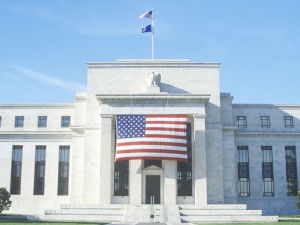
Talking the talk
For once the governor of the Bank of England’s words helped sterling to move higher against its peers, even if that was not the way it looked as though it was heading at the outset. Prior to last week Mark Carney’s last word on the subject of UK interest rates was that they are not going higher because the economic circumstances are not appropriate. What he said on Wednesday was that when those circumstances are appropriate, rates will go up.
No, there isn’t any disparity between the two statements. But investors thought they detected a change of tone, a switch from not now to not yet. Financial futures pricing, which the previous day had implied a 7% chance of rate increase this year, rapidly upped that likelihood to 50%. Sterling jumped an immediate cent higher and it has held onto the gain.
Eating his words
Mario Draghi, the head of the European Central Bank, made a very similar comment at the beginning of last week, sending the euro higher. However, 24 hours later “sources familiar with the ECB chief’s thinking” told Reuters that investors had read too much into Sig. Draghi’s remarks. The euro fell back.
Overall the pound and the euro are unchanged on the week against one another. Both are almost 2% higher against the US and Australian dollars and 3% stronger against the Japanese yen.
Joining the party
On Wednesday Stephen Poloz, the governor of the Bank of Canada, shared a podium with Mr Carney and Sig. Draghi at an ECB forum on central banking. His contribution included a comment that “low interest rates have done their job”.
It raised two possibilities:
- He could well have been teeing up investors for higher Canadian interest rates when the BoC has its next policy discussion next week and
- It might signify a meeting of the minds – perhaps all three of them have come to the conclusion that the diminishing returns from ultra-low rates mean the time is coming to take monetary policy back towards what used to be considered “normal”.
The good news
Although it will not happen soon or quickly, the rest of the West seems to falling into step with the US Federal Reserve, which began 18 months ago to take interest rates back to levels that mean something to savers as well as borrowers. Paradoxically, a shift in that direction could help to boost inflation and pay packets.
The bad news
Tighter monetary policy would also mean that the ECB and BoE will eventually have to sell off the billions of bonds and other securities that they soaked up (and the ECB continues to soak up) during their quantitative easing programmes. Such a thing has never been done before. The central banks will undoubtedly tread carefully but that does not guarantee that they will not trip up.
Sarah, Senior Account Manager at Moneycorp
Moneycorp is one of the largest international payment companies supporting over 90 currencies. Last year Moneycorp traded over £22.6 billion worth of international money transfers. Find out how Moneycorp can help you with your international transfer here.






